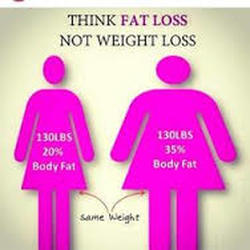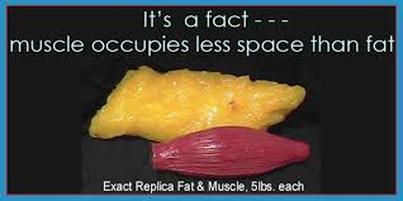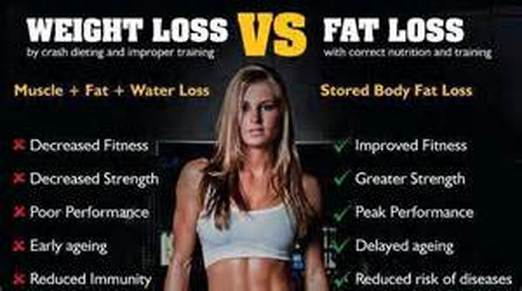
Think Fat Loss not Weight Loss
Ever since the aerobics revolution in the 1960s the Health Industry has supported the concept of weight loss to combat the rise in overweight and obesity (see Body Mass Index). Go through a selection of the health and fitness sources and the books will likely include "weight loss" in the title or subtitle.
To put this in perspective, and being somewhat provocative you could say to someone who wants to lose weight, "don't eat for 2 days" or "don't drink for a day". That person would lose weight but would end up hungry, thirsty, probably less healthy and just a smaller version of themselves! The danger in thinking weight loss, particularly if you chose a calorie restricted approach, is that the body is very smart. As soon as less calories go in the body thinks "ah! ah! less food coming in better hold on to what I have so I will slow my metabolism down!" So the weight plateaus, you get fed up and the weight creeps back. Yo-Yo-dieting. The additional danger is that with less nutrients and enzymes coming in, the body will leech its needs from your muscles and bones:
We now know that losing muscle during standard dieting makes it far more likely you will not only regain the weight you lost, but end up fatter than you were before. This fact, combined with the insatiable hunger, relentless cravings, and inconsistent energy produced by this approach, almost guarantees a return to our bigger, fatter selves.
Research tells us the long term success rate of this approach is less than 5%. Research also tells us that 66% of individuals who take this approach end up fatter within 2 years after their diet.
Caloric weight loss may work in the short run to make you smaller, but even that won’t last as almost everyone rebounds and regains the weight. Here is a critical distinction the weight loss world seems to miss: a plan that works well in the short term but is impossible to maintain in the long-run, is not a plan that works.

Muscle vs Fat
10lb of muscle at rest will burn 50 calories per day whilst 10lb of fat will only burn 20 calories. Therefore building muscle will speed up your metabolism and help reduce the fat content of your body - no, fat does not turn into muscle, it is replaced by muscle.
Also muscle does not weigh more than fat. 1lb of muscle in the same as 1lb of fat, it is just denser helping to create a more sphelt shape.
10lb of muscle at rest will burn 50 calories per day whilst 10lb of fat will only burn 20 calories. Therefore building muscle will speed up your metabolism and help reduce the fat content of your body - no, fat does not turn into muscle, it is replaced by muscle.
Also muscle does not weigh more than fat. 1lb of muscle in the same as 1lb of fat, it is just denser helping to create a more sphelt shape.
So, weight loss and fat loss are not necessarily the same thing. Weight loss is very easy to accomplish. All you have to do is take in less calories than what your body burns on any given day. So if your body burns 2,500 calories, and you just take in 2,000 calories, weight loss will occur. The problem is that if those calories that you take in do not have the right amount of nutrients, the weight loss may come in the form of muscle tissue loss, water weight, and perhaps even some bone mass!
It is an unfortunate aspect of nature that for most people, as we age, body fat reduction occurs at a slower rate (but see anti-ageing strategies). However, don't be discouraged but rather set realistic goals (see S:M:A:R:T) including following a balanced nutrition plan, keeping up regular exercise and most importantly include muscle building/retaining activities.
It is an unfortunate aspect of nature that for most people, as we age, body fat reduction occurs at a slower rate (but see anti-ageing strategies). However, don't be discouraged but rather set realistic goals (see S:M:A:R:T) including following a balanced nutrition plan, keeping up regular exercise and most importantly include muscle building/retaining activities.
